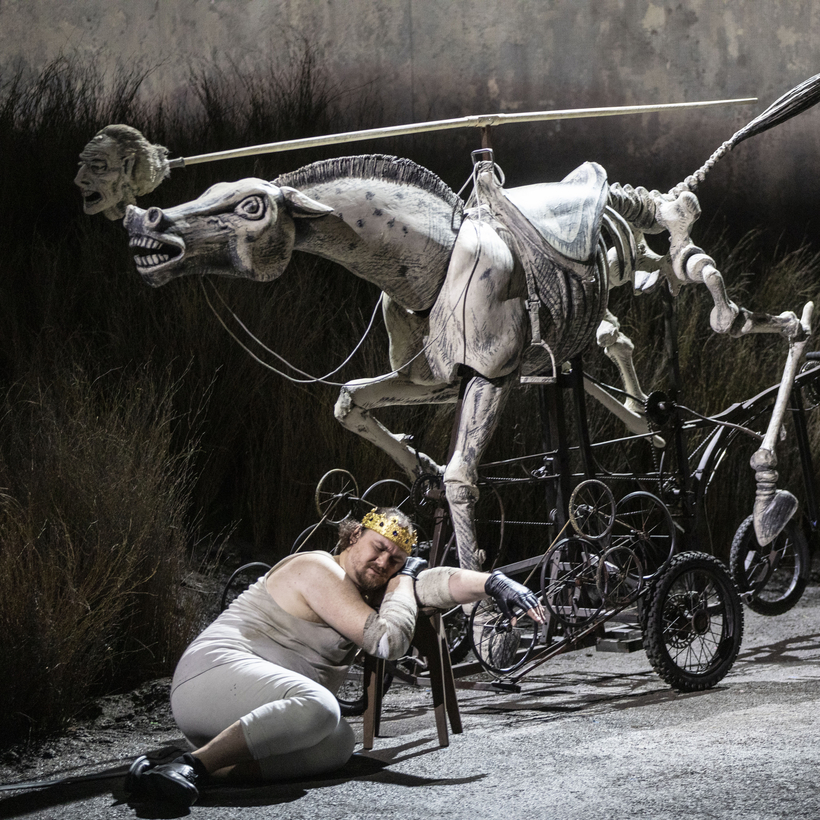Why does the opening of the summer classical-music season in Europe feel so troubling? The stately festivals in Salzburg, Bayreuth, Munich, and Aix-en-Provence have apparently presented a series of new operatic productions of profound darkness and hopelessness, even when the intent of the composers—Mozart and Wagner, in this case—was to project resolution and uplift.
You might think this has something to do with the pandemic, but that would not explain a long European tradition of provocative stagings of the classics, one that began in the 1950s and might be oxymoronically described as “the institutional avant-garde.”
Everyone of a certain age grew up in the shadow of World War II. For us Americans, it was an “over there” war, but for European boys and girls, it was very much an in-your-face war, one that was fought (and lost, for those on the Continent) and was evident in every moment of your life, no matter if your birth year was 1945 or 1970.

When I first visited Europe, in 1966, the jackhammers created an unending cacophony in the streets of Berlin, Cologne, and Munich. Vienna was a very gray old lady of a city—“old men reminiscing about their grandfathers’ stories of the good old days” is what I wrote to my parents that summer. Frau Pöhner, who rented a room for visitors to the Bayreuth Wagner festival, asked me to help her husband lift a paint can “because his arm doesn’t work so good since the war.” I had a pretty good idea of what side Herr Pöhner fought on.
That brings me back to this summer and the reviews coming out of Germany, France, and Austria. It has been said that you can learn more from a museum from what it does not exhibit than from what it puts on its walls. Music is more complicated than painting—it is always changing before our ears, and opera adds visual art to that combustible and kinetic mixture. Because of this, the question becomes not only what we should perform but, also, how we should perform it.
Let’s start with the how.
The Aix-en-Provence production of Tristan und Isolde begins with a staging of its titanic prelude. (New rule: Never allow a director to stage a prelude or overture. Composers know when to raise the curtain, making the invisible visible. Storytelling begins in the theater of the mind.) This new Tristan und Isolde opens on a wealthy Paris apartment during a party, with the guests wearing contemporary dress and clinking champagne glasses. (New rule: If the costume sketches have all the men in a medieval drama wearing Armani, send them back to the drawing board.) If only the party-goers in this production had been throwing spaghetti on the walls, there might have been a sense of humor in all the irrelevant shenanigans.

In Bayreuth, The Flying Dutchman also has a staged overture, complete with the title character as a little boy reaching up to his mother’s foot as she dangles from the noose from which she has hanged herself; the opera ends with the characters shooting each other. (New rule: Before you hire a director to interpret an opera, find out if they believe in happy endings. Nobody leaves a baseball game in which their favorite team has just lost saying, “I deserved that because they, like me, are losers.”) The one actual triumph of this new Flying Dutchman is not onstage but in the Bayreuth pit: a woman, the Ukrainian Oksana Lyniv, conducted the opera—the first woman to do so since the festival began, in 1876.
General rule: Assume that audiences are smart. People understand symbolism, metaphors, and parables. Stories that take place in ancient times do not require being set in modern times in order to be perceived as relevant. See, for example, the Bible.

Now, let’s discuss the what.
With the new production of Luigi Nono’s 12-tone opera Intolleranza 1960 as the capstone of the current Salzburg Festival, it seems that the leaders of Europe’s classical-music scene are still grappling with an unending, confessional display of unresolved emotions and an unwillingness to accept joy and triumph over adversity.
While the 21st-century cultural leaders (who, apart from Bayreuth’s Katharina Wagner, are all men) are presenting grim and dystopian visions of Tristan und Isolde, The Flying Dutchman, and Don Giovanni (Mozart’s opera is a dramma giocoso) by green-lighting the insertion of incoherent adolescent images into the notes of the masters—who have no say in these matters—they still do not produce the music banned by Hitler and Mussolini.
This surely remains the last barrier toward reconciliation: confronting the fact that their European parents and grandparents would have incarcerated and perhaps murdered Korngold, Weill, Hindemith, and Schoenberg—all of whom escaped, composed music, and died as American citizens. Instead of playing their “American” music, the new productions retreat into the core European repertory and affix new—and depressing—stories onto the old ones.
The questions remain: Where is Hindemith’s 1957 magnum opus, Die Harmonie der Welt (The Harmony of the Universe), which tells the story of Johannes Kepler’s discovery of planetary motion and ends with an epic passacaglia in which each character becomes a planet? (Imagine that production!) Ironically, Wieland Wagner—Katharina’s uncle—had planned to produce Hindemith’s Mathis der Maler at Bayreuth, but died in 1966, before he could make that happen. Even if this were to be considered today, the Wagner festival is no longer permitted by law to produce anything but Wagner’s operas, starting with The Flying Dutchman and ending with Parsifal.

Where is Kurt Weill’s 1937 Der Weg der Verheissung (The Eternal Road), which brought him and fellow Jews Max Reinhardt—Europe’s greatest stage director—and poet-author Franz Werfel to America? Like Intolleranza 1960, these operas tell stories of war and persecution but end in triumph.
No one could possibly object to experiencing, and re-evaluating, Nono’s opera: an important example of the Italian avant-garde during the Cold War, when Italians supported the very “formulistic” music that Soviet Communists banned. Nono’s protagonist dies in excruciating agony at the banks of a river when it overflows. In contrast, however, when the river overflows at the end of Wagner’s “Ring,” a bright future emerges for a better world, cleansed of the old, corrupt gods.
The girls and boys who grew up in the wake of a war that made music a weapon and its greatest living composers a target apparently will have none of Wagner’s redemptive vision. For them, sadly, there still is no room for joy, playfulness, or a happy ending.
The Salzburg Festival is on through August 30
John Mauceri is a Tony-, Emmy-, and Grammy-winning conductor. His book The War on Music will be published by Yale University Press in the spring of 2022



 Discover
Discover